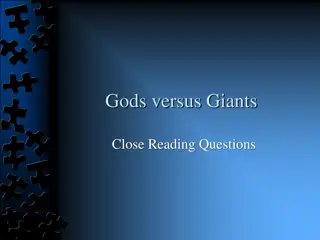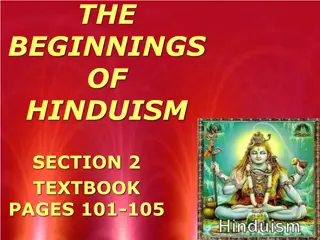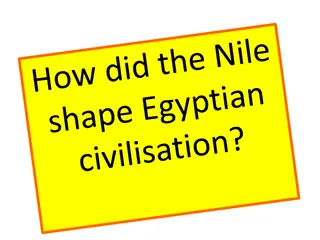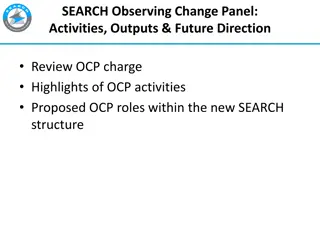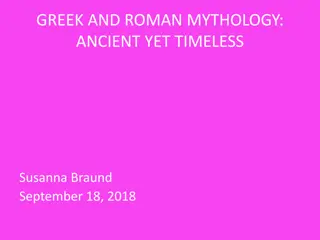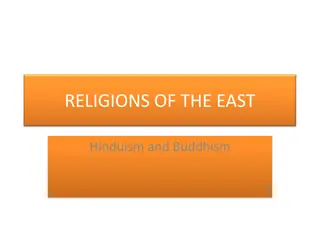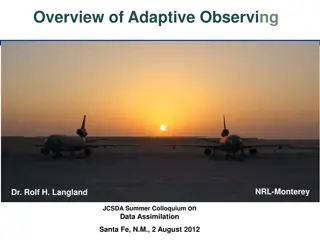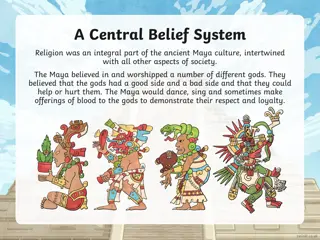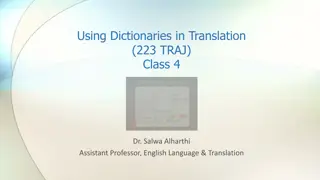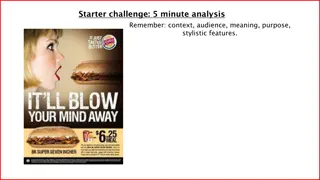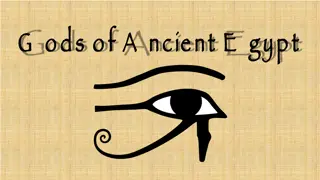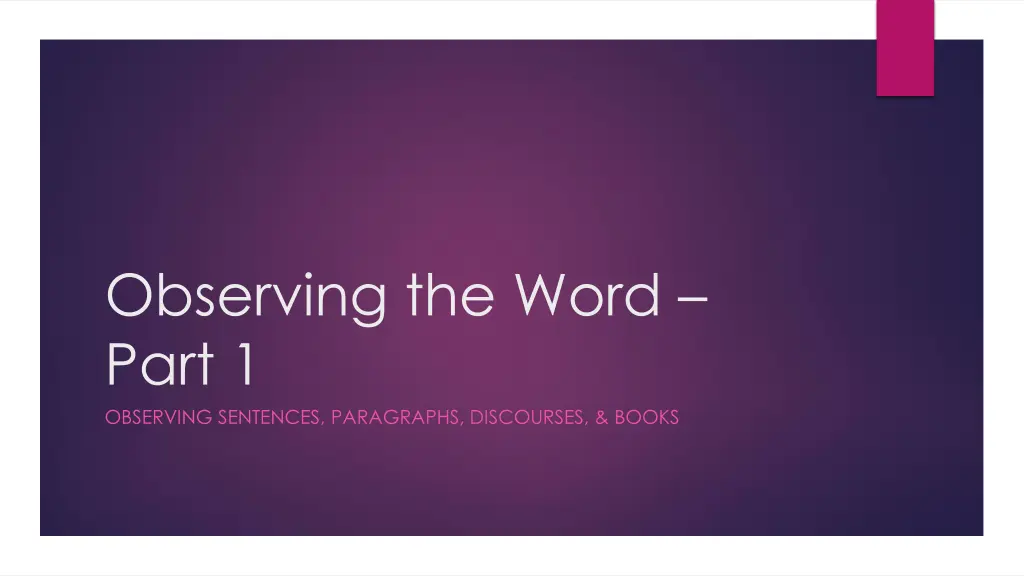
Understanding Biblical Texts Through Observation Techniques
Learn effective observation techniques to explore sentences, paragraphs, discourses, and books of the Bible. Discover how to analyze repetitions, contrasts, comparisons, and other details in biblical text for deeper understanding. Take your time to observe and refrain from immediate interpretation to grasp the true essence of the scriptures.
Download Presentation

Please find below an Image/Link to download the presentation.
The content on the website is provided AS IS for your information and personal use only. It may not be sold, licensed, or shared on other websites without obtaining consent from the author. If you encounter any issues during the download, it is possible that the publisher has removed the file from their server.
You are allowed to download the files provided on this website for personal or commercial use, subject to the condition that they are used lawfully. All files are the property of their respective owners.
The content on the website is provided AS IS for your information and personal use only. It may not be sold, licensed, or shared on other websites without obtaining consent from the author.
E N D
Presentation Transcript
Observing the Word Part 1 OBSERVING SENTENCES, PARAGRAPHS, DISCOURSES, & BOOKS
You have the rest of your life to get acquitted with scripture, so take your time! SOMETHING TO REMEMBER Tips: Take a couple of books and read/study for the entire year.
IF YOU MOVE STRAIGHT FROM YOUR INITIAL READING OF A PASSAGE TO THE APPLICATION OF THAT PASSAGE, YOU WILL REMAIN TIED TO THE PREVIOUS UNDERSTANDING OF THAT TEXT. CAUTION
OBSERVATION Observe as many details as possible Refrain from interpreting or applying the text What does the text say? (not: what does the text mean) Survey small pieces of text & big pieces of text Small pieces: words, phrases, sentences Big pieces: paragraphs, chapters, stories Example of biblical observation Repetition of words, contrasts, comparisons, lists, cause and effects, figure of speech, conjunctions, verbs, pronouns
Observation of Sentences Repetition of Words Contrasts Comparisons Lists Cause & Effect Figures of Speech Conjunctions Verbs Pronouns
Repetition of Words Look for words that repeat. First be sure to note any words that repeat within the same sentence you are studying. Then survey the sentences around the text you are reading and look for repetition in the larger passage. Let s Practice: 1 John 2:15-17 15Do not love the world or anything in the world. If anyone loves the world, love for the Father[a]is not in them.16For everything in the world the lust of the flesh, the lust of the eyes, and the pride of life comes not from the Father but from the world.17The world and its desires pass away, but whoever does the will of God lives forever.
Contrasts Look for items, ideas, or individuals that are contrasted with each other. Let s Practice: Proverbs 14:31 Whoever oppresses the poor shows contempt for their Maker, but whoever is kind to the needy honors God.
Comparisons Contracts focuses on differences. Comparison focus on similarities. Look for items, ideas, or individuals that are compared with each other. Let s Practice: Proverbs 25:26 Like a muddied spring or a polluted well are the righteous who give way to the wicked.
Lists Any time you encounter more than two itemized things; you can identify them as a list. Write down and explore its significance. Is there any order? Are they grouped in any way? Let s Practice: Galatians 5:22-23 But the fruit of the Spirit is love, joy, peace, forbearance, kindness, goodness, faithfulness,23gentleness and self-control. Against such things there is no law.
Cause & Effect Often the biblical writes will state and cause and then state an effect of that cause. Let s Practice: Proverbs 15:1 A gentle answer turns away wrath, but a harsh word stirs up anger.
Figures of Speech Figures of speech are images in which words are used in a sense other than the normal, literal sense. Let s Practice: Psalm 119:105 Your word is a lamp for my feet, a light on my path.
Conjunctions If we imagine the biblical text to be like a brick house, then conjunctions are the mortar that holds the bricks together. One critical aspect of careful reading is to no all conjunctions (and, for, but, therefore, since, because, etc.) Let s Practice: Romans 6:23 For the wages of sin is death, but the gift of God is eternal life in[a]Christ Jesus our Lord.
Verbs Verbs communicate action. As you observe the text, be sure to note the verbal action. Try to identify what kind of verb is used. Is the verb past, present, or future tense verb Let s Practice: Ephesians 4:2-3 Be completely humble and gentle; be patient, bearing with one another in love.3Make every effort to keep the unity of the Spirit through the bond of peace.
Pronouns Note all pronouns and be sure to identify the antecedent (to whom or to what the pronoun refers). Let s Practice: Ephesians 1:3 Praise be to the God and Father of our Lord Jesus Christ, who has blessed us in the heavenly realms with every spiritual blessing in Christ.
Group Exercise Read Romans 12:1-2 Observe Repetition of Words Contrasts Therefore, I urge you, brothers and sisters, in view of God s mercy, to offer your bodies as a living sacrifice, holy and pleasing to God this is your true and proper worship.2Do not conform to the pattern of this world, but be transformed by the renewing of your mind. Then you will be able to test and approve what God s will is his good, pleasing and perfect will. Comparisons Lists Cause & Effect Figures of Speech Conjunctions Verbs Pronouns
Homework Take the scripture you want to understand the meaning of, and write down 30 observations based on the sentences.
Observation of Paragraphs General & Specific Questions & Answers Dialogue Purpose/Result Statements Means Conditional Clauses Actions/Roles of People & Actions/Roles of God Emotional Terms Tone

![[PDF⚡READ❤ONLINE] Solar Surveyors: Observing the Sun from Space (Springer Praxis](/thumb/21536/pdf-read-online-solar-surveyors-observing-the-sun-from-space-springer-praxis.jpg)
